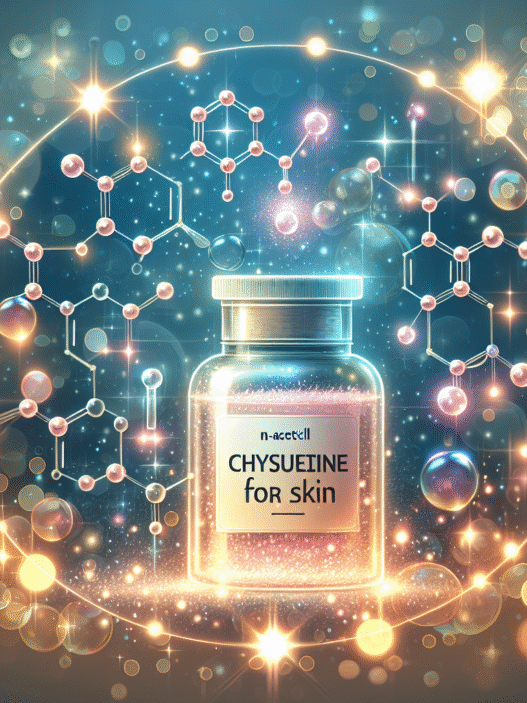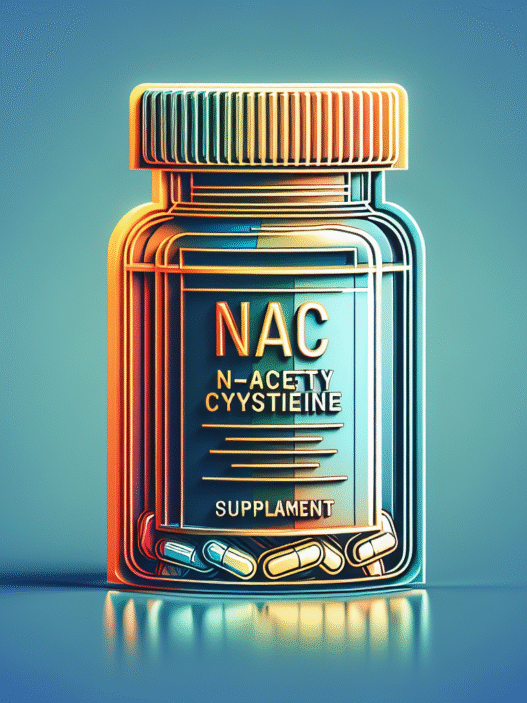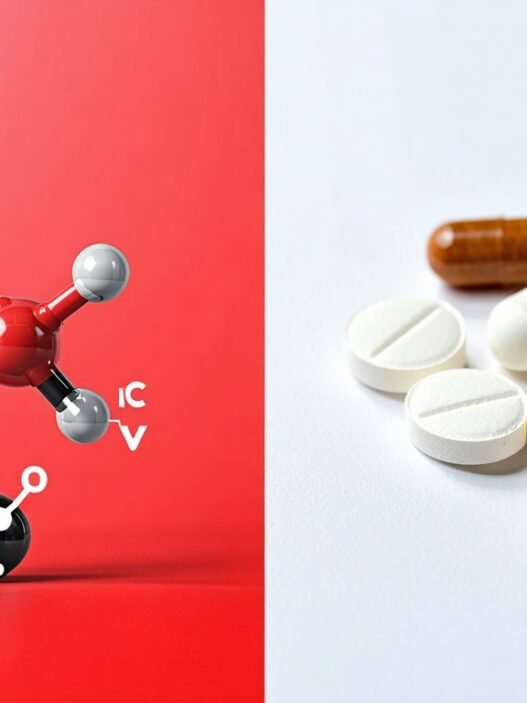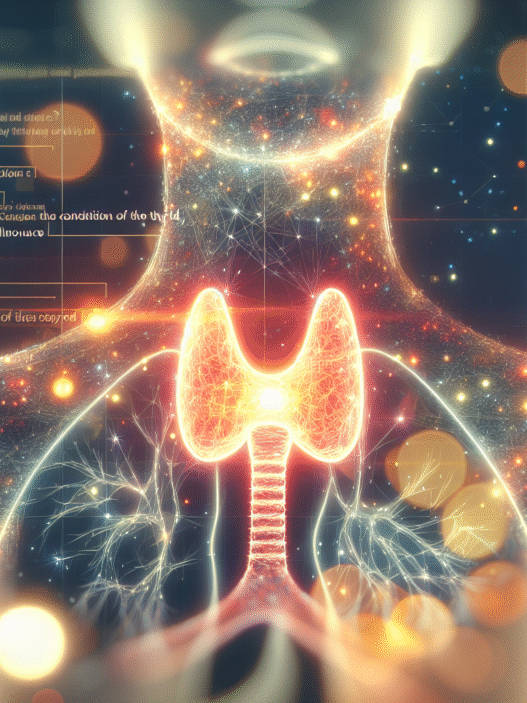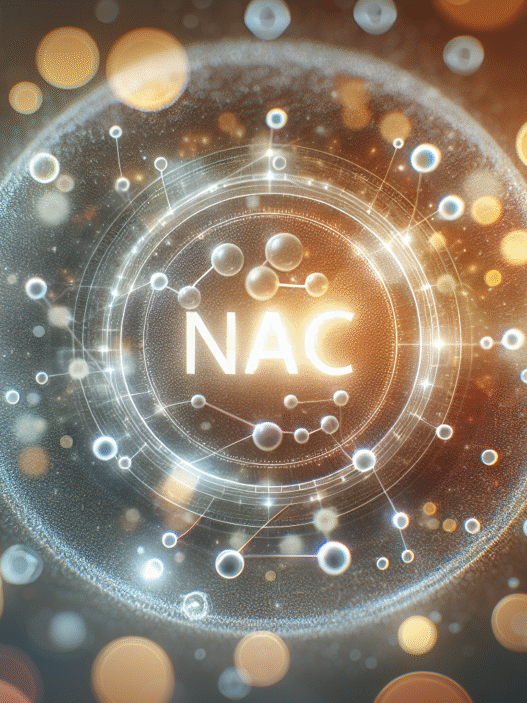Understanding NAC
N-Acetyl Cysteine Overview
N-Acetyl Cysteine (NAC) is a derivative of the amino acid cysteine and has gained attention for its multiple health benefits. It serves a crucial role in replenishing glutathione (GSH) levels, which is often referred to as the body’s master antioxidant. NAC has been widely utilized since the 1960s as a mucolytic agent and as an antidote for acetaminophen overdose. In addition to its established uses, NAC possesses antioxidant, cytoprotective, anti-inflammatory, antimicrobial, and mucolytic properties, making it a promising therapeutic option for various health concerns (PubMed Central).
The versatile applications of NAC include support for liver health, combating chronic diseases, and potentially playing a role in managing oxidative stress and inflammation. Research continues to explore the full range of its benefits, particularly in conditions influenced by oxidative damage.
Mechanism of Action
NAC operates through several biological pathways to exert its beneficial effects. The primary mechanism involves the replenishment of glutathione stores in the body, which is essential for combating oxidative stress. NAC triggers the production of intracellular hydrogen sulfide (H2S), a signaling molecule that is converted to sulfane sulfur species predominantly within the mitochondria. This process is thought to contribute to the antioxidative and cytoprotective capacities of NAC. Enzymes such as 3-mercaptopyruvate sulfurtransferase and sulfide:quinone oxidoreductase play a crucial role in this transformation.
NAC also helps to reduce levels of pro-inflammatory markers, such as tumor necrosis factor-alpha (TNF-α) and interleukins (IL-6 and IL-1β). By modulating the immune response and addressing inflammation, NAC demonstrates considerable promise as a therapeutic agent.
For individuals interested in learning more about the specific benefits, including n-acetyl cysteine benefits for skin and n-acetyl cysteine anti-aging properties, further exploration into this compound may yield additional insights into its health capabilities.
Benefits of NAC
N-Acetyl Cysteine (NAC) is a supplement known for its numerous health benefits. It plays a crucial role in promoting overall wellness through its antioxidant properties, liver and kidney support, and benefits for mental health.
Antioxidant Properties
NAC is primarily valued for its ability to aid in the production of antioxidants, specifically glutathione. Glutathione is a powerful antioxidant that neutralizes free radicals, helping to protect the body from oxidative stress, which can lead to various health issues. NAC’s role in replenishing glutathione is vital for enhancing the immune system and supporting toxin-elimination processes (Healthline).
| Antioxidant Benefits | Description |
|---|---|
| Glutathione Production | NAC helps produce and replenish glutathione, combating oxidative stress. |
| Free Radical Neutralization | By neutralizing free radicals, NAC protects cells from damage. |
For further reading on antioxidant properties, check our article on NAC antioxidant properties.
Liver and Kidney Support
NAC has been shown to support liver and kidney health by aiding in detoxification processes. It is particularly noted for its effectiveness in cases of acetaminophen overdose, assisting in the prevention or reduction of liver and kidney damage (Healthline). Its antioxidant and anti-inflammatory characteristics are essential for protecting these vital organs.
| Organ Support | Benefits |
|---|---|
| Liver | Prevents and diminishes damage due to detoxification support. |
| Kidney | Aids in preserving kidney function and overall health. |
For a more detailed discussion on dosage, refer to our article on N-acetyl cysteine dosage.
Mental Health Benefits
NAC may also promote mental health by regulating glutamate levels in the brain and replenishing glutathione, potentially improving symptoms associated with various mental health conditions. Research suggests NAC could be beneficial for individuals with bipolar disorder, schizophrenia, obsessive-compulsive disorder (OCD), and substance use disorder, positively impacting overall quality of life.
| Mental Health Conditions | Potential Benefits |
|---|---|
| Bipolar Disorder | Helps regulate mood and symptoms. |
| Schizophrenia | May alleviate some symptoms associated with the disorder. |
| OCD | Can provide relief from compulsive behaviors. |
| Substance Use Disorder | Aids in reducing cravings and supporting recovery. |
For more insights on using NAC for mental health, explore our article on NAC supplement benefits.
These benefits highlight how NAC can be an important addition to health routines aimed at enhancing longevity and supporting vital body functions.
NAC for Respiratory Health
N-Acetyl Cysteine (NAC) offers several health benefits, particularly for those with existing respiratory conditions. Its role as an expectorant and antioxidant makes it an effective choice for promoting respiratory health.
Respiratory Condition Relief
NAC acts as an expectorant, helping to relieve symptoms associated with respiratory conditions such as chronic obstructive pulmonary disease (COPD) and chronic bronchitis. It improves lung function by enhancing inflammatory responses and reducing mucus buildup in the airways. According to Healthline, NAC can significantly alleviate symptoms related to these conditions, providing comfort for those affected.
| Condition | NAC Benefits |
|---|---|
| COPD | Improves lung function |
| Chronic Bronchitis | Reduces mucus buildup and inflammation |
NAC not only assists in clearing mucus but also supports the overall health of the respiratory system.
Lung Function Improvement
Regular use of NAC has been shown to enhance lung function over time. Its powerful antioxidant properties contribute to the detoxification process in the lungs, aiding in reducing oxidative stress and inflammation. This is especially crucial for individuals with lungs compromised by smoking-related conditions or other pollutants.
Research indicates that NAC may also benefit those undergoing treatments that can affect lung function, enabling them to maintain better respiratory health. Enhanced lung function not only improves oxygen circulation but also contributes to overall well-being.
Those interested in the broader scope of NAC’s potential benefits can explore more about n-acetyl cysteine benefits for various health conditions, including its implications for liver detoxification and longevity seekers.
NAC for Brain Health
N-Acetyl Cysteine (NAC) not only contributes to antioxidant functions and liver support but also offers significant benefits for brain health. This section examines NAC’s role in cognitive function support and its potential advantages for neurological disorders.
Cognitive Function Support
NAC is recognized for its ability to replenish glutathione, a crucial antioxidant in the brain. This replenishment is vital for maintaining brain health, as glutathione plays a key role in reducing oxidative stress and inflammation. By lowering these harmful factors, NAC could help slow cognitive decline associated with age-related conditions, notably Alzheimer’s disease. Additionally, NAC’s regulation of glutamate levels — an important neurotransmitter — contributes to improved neural communication and overall cognitive function.
| Mechanism | Potential Benefit |
|---|---|
| Replenishes glutathione | Reduces oxidative stress and inflammation |
| Regulates glutamate | Improves neural communication |
Neurological Disorder Benefits
NAC’s protective properties extend beyond cognitive enhancement to include neurological disorders such as Parkinson’s disease. Research indicates that NAC may improve dopamine function, potentially alleviating some symptoms associated with this condition. Its antioxidant and anti-inflammatory effects make NAC a promising adjunct therapy for managing neurodegenerative diseases. Moreover, studies hint at its potential applications in the treatment of other neurological conditions, although more extensive research is needed to validate these findings.
NAC’s double action of protecting brain cells from oxidative damage while supporting neurotransmitter balance establishes it as a crucial compound for those concerned about cognitive decline and neurological health. For individuals interested in the broader spectrum of N-acetyl cysteine benefits, understanding its role in brain health is essential.
Incorporating NAC into a health regimen may not only support cognitive health but also present a preventive measure against neurodegenerative disorders. As research continues to unravel the complexities of NAC’s mechanisms, its therapeutic potential remains a topic of interest in both clinical and health-enthusiast communities.
NAC Interactions and Side Effects
N-Acetyl Cysteine (NAC) is a powerful supplement known for its various health benefits. However, like any other supplement or medication, it is important to be aware of potential drug interactions and common side effects that may arise during its use.
Drug Interactions
NAC can interact with certain medications, affecting their efficacy and potentially leading to undesirable effects. Notable interactions include:
| Medication | Interaction Details |
|---|---|
| Acetaminophen (Tylenol) | NAC might decrease the effectiveness of activated charcoal, which is often used to prevent poisoning from medications like acetaminophen (WebMD). |
| Chloroquine | It could reduce the efficacy of chloroquine, a medication commonly used in the treatment of malaria. |
| Antihypertensive drugs | NAC might lower blood pressure; when taken with antihypertensive medications, it could result in excessively low blood pressure, necessitating close monitoring. |
Individuals considering NAC supplementation should consult with their healthcare provider, especially if they are on medication.
Common Side Effects
Although NAC is generally well-tolerated, it can cause side effects in some individuals. The most common side effects include:
- Gastrointestinal issues: Nausea, vomiting, and abdominal pain are frequently reported.
- Anaphylactoid symptoms: These can include airway obstruction (bronchospasm), angioedema (swelling), dyspnea (shortness of breath), hypotension (low blood pressure), tachycardia (increased heart rate), urticaria (hives), and reactions at the injection site (Drugs.com).
It is important for users to be alert for these symptoms and seek medical attention if adverse reactions occur. Knowing both the interactions and potential side effects associated with n-acetyl cysteine benefits can empower individuals to make informed decisions regarding their health and supplementation practices.
Research and Future Potential
Current Studies on NAC
N-acetyl cysteine (NAC) has been a subject of extensive research due to its antioxidant properties and role in supporting various bodily functions. Studies indicate that NAC may have potential benefits across a range of health concerns, including chronic lung diseases such as COPD, liver and kidney function improvement, and even mental health conditions like substance use disorders.
Additionally, emerging research suggests NAC may aid in balancing blood sugar levels in individuals with insulin resistance and promoting enhanced brain function. Its role in mitigating oxidative stress is a growing area of interest, particularly in relation to its potential therapeutic applications in infectious diseases, such as influenza and COVID-19. NAC is thought to reduce inflammation, decrease viral load, and improve immune response (PubMed Central).
| Area of Research | Potential Benefits |
|---|---|
| Chronic lung diseases | Treatment and management of conditions like COPD |
| Liver and kidney function | Enhanced detoxification processes |
| Mental health conditions | Support for substance use disorders |
| Blood sugar balance | Improvement in insulin sensitivity |
| Infectious diseases | Reduction of oxidative stress and inflammation |
Therapeutic Potential
Beyond its established health benefits, NAC presents promising therapeutic potential in cancer treatment. Preliminary studies have looked at its effects on various cancers, including triple-negative breast cancer and lung cancer in smokers. However, while there is evidence indicating that NAC may aid in cancer management, strong conclusive evidence to support NCC as a preventive measure for cancer is still lacking (WebMD).
NAC’s versatility extends into the realm of skin health as well. Research is exploring its effects on skin rejuvenation, where it may serve as an effective treatment for conditions like acne and oxidative skin damage (n-acetyl cysteine skin rejuvenation benefits). With ongoing studies, there remains great potential for discovering new applications that can leverage its antioxidant properties. For a deeper dive into its many advantages, check out our article on nac supplement benefits.
As research continues, NAC is likely to reveal even more applications in the fields of detoxification and longevity, making it a valuable addition for those seeking to enhance their health and well-being. For patients interested in integrating NAC into their health regimen, understanding n-acetyl cysteine dosage and its method of use is essential.















